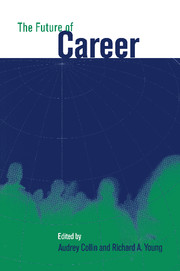1 - Introduction: framing the future of career
Published online by Cambridge University Press: 06 January 2010
Summary
Career has been a key notion in twentieth-century Western societies. Although ‘career’ is often used as a short-hand term for work histories and patterns, it has also served more significant purposes. Many in our complex and highly differentiated society use it to attribute coherence, continuity, and social meaning to their lives. By tying people to labour markets and employment in ways that are both personally meaningful and beneficial to work organisations and society, career is also part of the rhetoric that supports the ideologies of society and thereby contributes to its stability. Thus, the future of career has implications not only for individuals, including their personal identity and meaning, but also for groups and institutions, and for society itself.
Like so many words in the English language, ‘career’ is flexible and elastic, enabling it to adapt well to a variety of functions and contexts. This makes it a term of multi-layered richness and ambiguity, which is a ‘major source of its power’ (Watts, 1981, p. 214). As we shall discuss here and, indeed, encounter in the various chapters of this book, ‘career’ is used in various ways: as a concept, and as a construct in lay, professional, and academic discourses. It is the future of this overarching notion of career that is the subject of this book.
Whatever the specific context in, or function for which, career is used, to date it has involved a representation or construction of actions and events, and in some instances, the self, across time. Janus-like, career relates the past and present to the future, including our planning for and anticipation of the future, and also addresses how the future motivates action and the construction of meaning in the present.
- Type
- Chapter
- Information
- The Future of Career , pp. 1 - 18Publisher: Cambridge University PressPrint publication year: 2000
- 24
- Cited by

